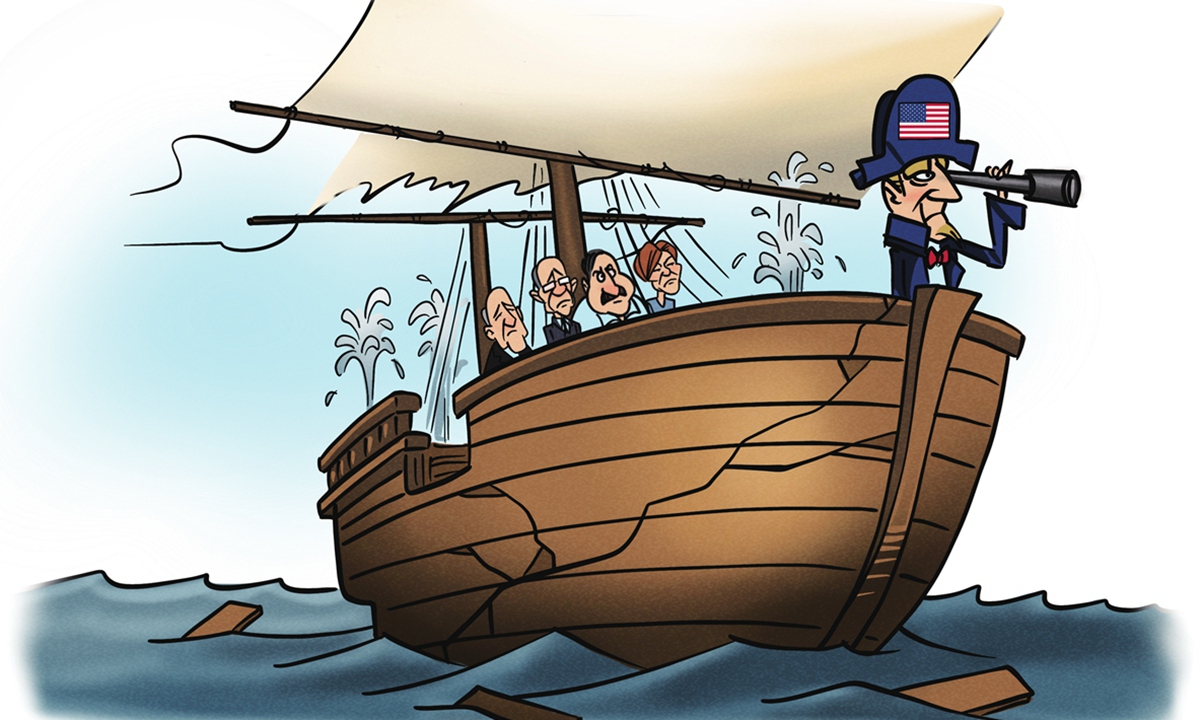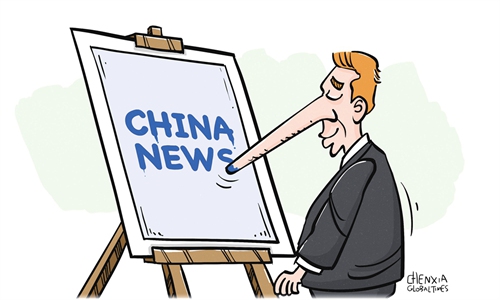
Illustration: Liu Rui/GT
Observers of the West have for some time now noted its obvious decline, or "sunset" as we may call it. How should we understand this decline? It is very important to take a historical perspective.The full historical perspective would consider the last five centuries or more. During this time, Western Europe slowly rose from its very backward state to colonise the world, enslave peoples from many of these colonies, plunder them for resources, engage in imperialist wars with one another, and then begin the slow decline from the 20th century until today. Key to this decline were the many anti-colonial struggles for national independence from Western powers: Latin America initially in the later 19th century, and then the peak of these struggles in the 20th century, when countries from Africa through East Asia to the Pacific achieved independence. In our time, we find all of these liberated countries increasingly setting the agenda throughout the world. Of course, the club of old colonial powers have tried to hang on. Think of the EU, of the rearguard efforts of the US and its machinations. But the decline is clear for all to see.
However, I would like to deal with the last 50 years, from the early 1970s. Why? This is the period when the "sunset of the West" became ever more obvious. In what follows, I will focus on internal dynamics and contradictions within Western countries.
We may distinguish between the economic base and the political, social and cultural factors that rely on this base. In terms of economics, the last relative "boom" of Western capitalist countries was in the 1950s and 1960s. Many were the factors for this "boom," especially post-war reconstruction, but also the relatively high levels of industrialization. The economic crisis of the early 1970s was the beginning of the recent decline. While growth rates in the 1950s and 1960s hovered around 5-6 percent, from the early 1970s, economic growth plunged. In an effort to fix the problems, the Western project of "neo-liberalism" was promoted: Public assets were sold off, industries closed, and some found that quicker profits could be made from dubious financial transactions rather than making anything - what is known as "financialization" or the "fictitious economy." This "neo-liberal" project failed to halt the decline, so that by the time of the economic crisis of 2008-09, Western economies had begun to "flat-line." They were ill-prepared for the economic crisis that arose in 2022: Their efforts to sanction Russia "boomeranged" to become a form of self-sanctioning.
This 50-year economic decline was bound to have an effect on political and cultural realities in Western countries. However, the effect was somewhat delayed and concealed by the triumphalism of the 1990s: The collapse of the Soviet Union and the counter-revolutions in Eastern European socialist countries led the West to believe it had triumphed. The West proclaimed that the "end of history" had arrived, that its values were "universal" values, and that Western economic and political systems were the final and highest form of human civilisation. This triumphalism concealed the hard facts on the ground. As their economies declined, Western political, social, and cultural forms began stagnating. They had ceased to renew themselves, and in due time they began to fragment. Old political and cultural certainties were breaking up, and social divisions became ever deeper.
For these reasons, we now see in Western countries wave after wave of protests, social unrest, violence, and extremist groups rising to dominance. It is difficult to find a Western country that is not facing these problems. Political instability has become the norm. The social fabric has been torn. The individualistic culture of Western liberalism is at a dead-end. However, the present is the result of the past: By now it should be clear that the instability, lack of safety and disharmony in Western countries has a longer history behind it.
We may ask: Are people in few Western countries of the world aware of their decline? Many are the possible examples, but I would emphasise the increasing rhetoric of recovering a lost "golden age," a desire to recover the former glory of empire, and political slogans that speak of "making great again." Obviously, when you want to recover something, you know at some level that it is already lost.
What about the future? One should be wary indeed about making predictions, but my sense is that in the next decade or so the Western countries of the world will face many more and deeper problems. I hope not, but it is difficult to see how they can avoid these problems. The "sunset" will not be easy for them, especially for the common people, who always suffer the most.
After the sun sets, it also rises again. In other words, there will eventually be a renewal of the West, but it will take immense effort to find the resources for renewal. When they finally achieve some type of renewal, the world and their place within it will be qualitatively different.
The author is a Marxist scholar from Australia, distinguished overseas professor at Renmin University of China, and on editorial board of the Australian Marxist Review. opinion@globaltimes.com.cn

